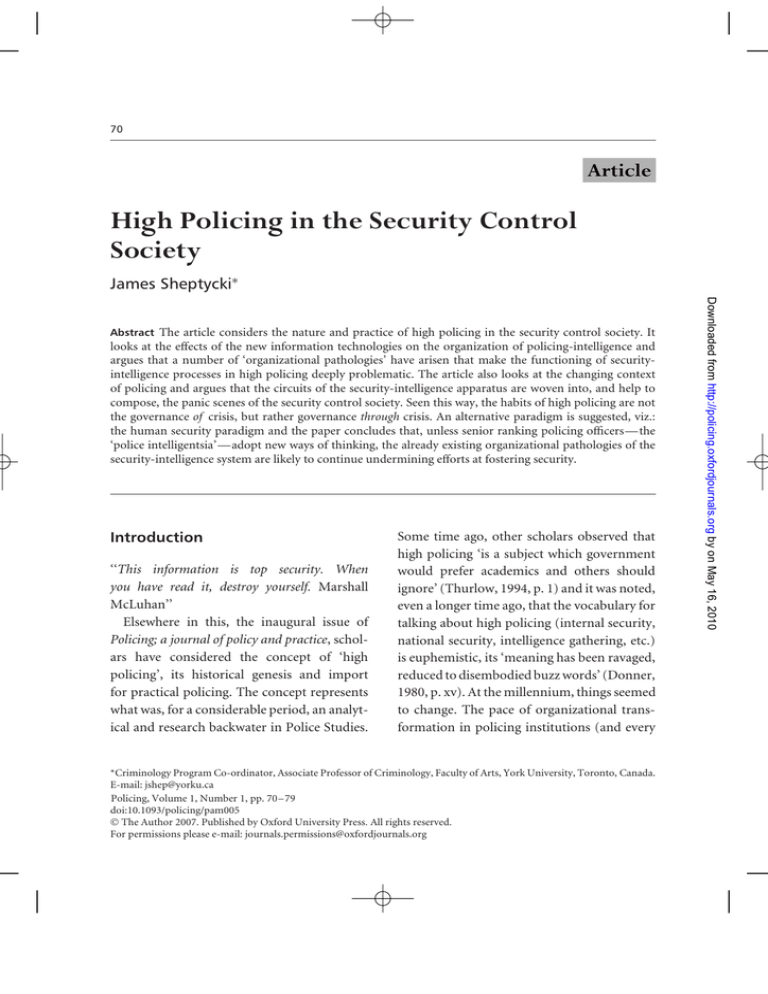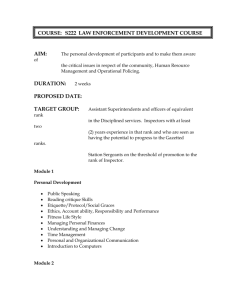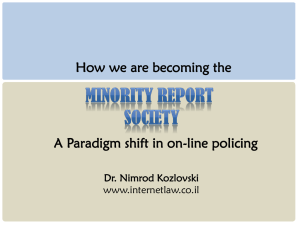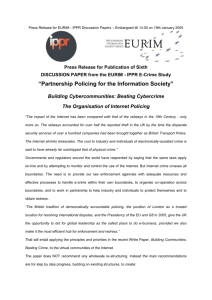High Policing in the Security Control Society Article James Sheptycki
advertisement

70 Article High Policing in the Security Control Society James Sheptycki∗ Introduction ‘‘This information is top security. When you have read it, destroy yourself. Marshall McLuhan’’ Elsewhere in this, the inaugural issue of Policing; a journal of policy and practice, scholars have considered the concept of ‘high policing’, its historical genesis and import for practical policing. The concept represents what was, for a considerable period, an analytical and research backwater in Police Studies. Some time ago, other scholars observed that high policing ‘is a subject which government would prefer academics and others should ignore’ (Thurlow, 1994, p. 1) and it was noted, even a longer time ago, that the vocabulary for talking about high policing (internal security, national security, intelligence gathering, etc.) is euphemistic, its ‘meaning has been ravaged, reduced to disembodied buzz words’ (Donner, 1980, p. xv). At the millennium, things seemed to change. The pace of organizational transformation in policing institutions (and every *Criminology Program Co-ordinator, Associate Professor of Criminology, Faculty of Arts, York University, Toronto, Canada. E-mail: jshep@yorku.ca Policing, Volume 1, Number 1, pp. 70–79 doi:10.1093/policing/pam005 The Author 2007. Published by Oxford University Press. All rights reserved. For permissions please e-mail: journals.permissions@oxfordjournals.org Downloaded from http://policing.oxfordjournals.org by on May 16, 2010 Abstract The article considers the nature and practice of high policing in the security control society. It looks at the effects of the new information technologies on the organization of policing-intelligence and argues that a number of ‘organizational pathologies’ have arisen that make the functioning of securityintelligence processes in high policing deeply problematic. The article also looks at the changing context of policing and argues that the circuits of the security-intelligence apparatus are woven into, and help to compose, the panic scenes of the security control society. Seen this way, the habits of high policing are not the governance of crisis, but rather governance through crisis. An alternative paradigm is suggested, viz.: the human security paradigm and the paper concludes that, unless senior ranking policing officers—the ‘police intelligentsia’—adopt new ways of thinking, the already existing organizational pathologies of the security-intelligence system are likely to continue undermining efforts at fostering security. High Policing in the Security Control Society Policing 71 for globally defining the public good and any future ills that may impact upon it is left in the shadows (Loader, 2002; Sheptycki, 2004). It is also the case that the technologies of surveillance underpinning the revolution in intelligence affairs have both ‘panoptic’ and ‘synoptic’ qualities (Mathiesen, 1997). They enable both the few to watch the many and the many to watch the few, and this has a number of outcomes, sometimes discussed in terms of the viewer-voyeur society, or the society of the spectacle. The paradox ensures that the spectacle is one of security control, and, a fortiori, the way that it is played out tends to be punitive and vengeance-oriented (cf. Haggerty and Ericson, 2006). Understanding the revolution in intelligence affairs potentially offers a way out of the paradox of the security control society. Critical analysis may allow for the possibility to intervene and undercut the conditions that foster it. However, it has to be recognized at the outset, that crime and security intelligence processes are politicized. Globally, we are in the midst of a transformation of the architectures of policing (Sheptycki, 2007; Walker, 2000). In tandem with the redesignation of serious and organized crime as matters of national security concern, the declaration of a world-wide war on terrorism has powerfully reshaped—and is reshaping—the policing apparatus. These tropes have accompanied the establishment of new supraordinate policing institutions—for example, the Serious and Organized Crime Agency in the United Kingdom and the Department of Homeland Security in the United States—and increasingly, the entire ambit of state-based policing activities have acquired the hallmarks of high policing. In the current climate of fear, academics who concern themselves with policing Downloaded from http://policing.oxfordjournals.org by on May 16, 2010 other major social institution) was ramped up as a result of the so called information revolution (Castells, 2000) and policing scholars saw a resulting shift in policing vocabulary with the introduction of new terms such as ‘strategic’ and ‘pro-active’, together with ‘intelligenceled policing’ (Maguire, 2000). Scholars coined the term ‘surveillant assemblage’ to describe the concatenation of surveillance technologies and techniques that are currently deployed in the governance of individuals and populations (Haggerty and Ericson, 2000). It is not implausible to suggest that there has been a revolution in intelligence affairs, brought about by a variety of causes: the rise of ‘postmodern’ society, the crosscurrents of economic, social, cultural and political ‘globalization’, and the ‘information revolution’. One of the key anxieties of our age has to do with the pervasive sense of insecurity that exists amidst, and in spite of, the multiplication of tactics and techniques for ensuring security. The irony is that the undeniable increase in surveillance and security practices is only congruent with the multiplication of insecurity and fear. This is the paradox of the security control society and it lies at the heart of the politics of policing surveillance. The almost endless possibilities for dissassembly and reassembly of information into intelligence—via techniques of data-mining—intensify this paradox because the purpose is not merely cura promovendi salutem (concerned with the promotion of public safety or public good) but also with cura advertendi mala futura (concerned to avert future ills) (cf. Sheptycki, 1998). Furthermore, in the transnational state system where governance transcends national jurisdictions and simultaneously valorizes the national security function, there are no confident and clear lines of political accountability, so the responsibility Article 72 Policing Article practice will have to work very hard to cultivate critical awareness, especially among senior police officers, if the conditions that underpin the security control paradox are to be undermined. Inside the machine a view of the inside workings of the policing machine. At a very fundamental level, the advent of new information technologies is driving drastic changes in the architecture of policing. The information revolution challenges a very basic premise of bureaucratic institutions—to which police agencies certainly conform—and that is their classic pyramidal structure. The literature on the social significance of information technologies defines IT broadly. The concept includes computers, obviously, but extends to include the entire array of machines for collecting, storing, analysing, duplicating, and disseminating information (Castells, 2000). Empirical observation confirms the significance of all of these technologies; they tend to erode information hierarchies and supplant them with networks. I realized this some time ago when interviewing undercover police officers working crossborder between the Netherlands and Belgium (Sheptycki, 2002, p. 84). I naively asked my interviewees about the difficulties I thought they might be experiencing due to the fact that they were from different national police agencies which used different radio equipment and communications protocols. They laughed and assured me that, with their newly acquired cell phones, they could be in touch with any number of colleagues in any number of locations irrespective of jurisdiction and without need of their centrally controlled radio systems. Many theorists of the information society argue that networked organizations are organizationally superior to hierarchically organized ones and this may, indeed, be the case generally (Zuboff, 1988). However, some organizations—particularly policing-type organizations—aggressively work to impose hierarchical models of information flow onto the Downloaded from http://policing.oxfordjournals.org by on May 16, 2010 Some time ago, and considerably prior to the supposed watershed marked by 9/11, scholars studying the changing morphology of European police institutions observed that the secretive and élitist ethos of the security services was gaining ground and worried that ‘the ideal of a transparent, rule governed and politically neutral [police] system would become no more than a remote possibility’ (Anderson et al., 1995, p, 175). A veil of secrecy has been cast over increasingly large parts of the policing apparatus, making it more difficult for academics to gain research access in order to gauge the nature and efficaciousness of the new intelligence-led policing paradigm (ILP) (Sheptycki, 2007). Lack of transparency retards the development of a critical perspective on contemporary high policing, a perspective which is essential because, as advocates of ILP have noted, ‘the paradigm shift to an intelligence-driven model needs a reality check’ (Christopher, 2004, p. 190). Fortunately, in the United Kingdom at least, there has been enough empirical research relating to these transformations so as to allow for such an analysis (e.g. Cope, 2004; Gill, 2000; Innes and Sheptycki, 2004). This is crucial because, although changes in the broader societal context of policing undoubtedly shape the current predicament, it may also be the case that the method of responding to that predicament is, itself, part of the problem. In confronting the security control paradox, it is essential to have J. Sheptycki High Policing in the Security Control Society Policing 73 strategic intelligence picture. The result is a failure of the intelligence process, but one that remains hidden behind public announcements regarding the successes of the special task forces. The extent of the failure to form a strategic view is practically incalculable, but a thought experiment is suggestive. Compare and contrast the harm due to crimes against the environment and those due to intellectual property theft (admittedly a difficult empirical question) and ask, on balance, how much harm is attributable to phenomena that fall under these rubrics and how much policing resource is presently devoted to preventing them? Police executives know that a considerable portion of policing resource is now devoted to the latter concern, but that very little is devoted to the former. Aware of the serious harm that results from eco-destruction and the sad future that will surely follow, this thought experiment ought to provide a sense of the magnitude of failure in the current strategic intelligence view of police agencies in countries with advanced economies. There are several more organizational pathologies that could be mentioned, but two are especially important, these are the continuing problem of ‘intelligence gaps’, and the difficulties that arise from ‘compulsive data demand’. Intelligence gaps exist for any number of reasons: inappropriate allocation of intelligence acquisition resources, hierarchical information flows, failure to report or record information to name only the most obvious. Such gaps exist at the same time that organizations are becoming equipped with new technologies which allow for the amassing and storage of inconceivably huge amounts of data, some of it held by private sector operators and sold to police and security intelligence organizations on a contractual, for profit, basis. Downloaded from http://policing.oxfordjournals.org by on May 16, 2010 naturally emerging networks. Irresistible force meets immovable object and a number of organizational pathologies arise (Sheptycki, 2004a, 2004b). Among professionals directly concerned with policing intelligence, one of the most often mentioned organizational pathologies is that of ‘information silos’—a concept which reflects the significance of the tension between hierarchical models and networked thinking. In information silos there is only one direction for information to flow and that is up. This contributes to another organizational pathology that professionals recognize: ‘linkage blindness’. Loosely speaking, because information is constrained to flow in bureaucratically defined pyramids—each with different governmental objects (e.g. drugs, illegal immigrants, illegal firearms, stolen property, terrorist cells, etc.) policing agents frequently fail to link bytes of information coursing in the veins of their intelligence systems and turn them into meaningful intelligence. Recognizing these organizational pathologies leads to mission failure and wishing to avoid accusations of incompetence, ad hoc task forces and intelligence centres are frequently formed. One example of this is the special intelligenceled policing squads dedicated to the pursuit of outlaw motorcycle gangs that have been constituted in a number of police institutions in Europe, Scandinavia, and North America. Crime attributed to such groups is very often high profile and notorious and it would be widely seen as a dereliction of duty if policing bodies failed to do something about it (Sheptycki, 2003). However, and despite any well-advertized tactical successes that may be scored, the multiplication of ad hoc special task forces and intelligence centres undermines attempts to refine a reliable and valid Article 74 Policing Article rank-structured bureaucracy to grasp the significance of networked thinking and to change itself that has brought about the range of organizational pathologies briefly discussed above. Thus hobbled, large-scale policing and security intelligence systems offer few safeguards against overt politicization of the intelligence process, save the integrity of the individual personnel who give it life. Articulated within an increasing climate of fear and insecurity, these pathologies undermine the credibility and the efficaciousness of the entire enterprise even while they feed on the increasing sense of panic. The changing context of policing Intelligence-led policing is a transnational phenomenon (Ratcliffe, 2004). Looking inside the global police security intelligence system, so to speak, it is apparent that there is a deep structural disjuncture between information hierarchies and information networks and that this has given rise to a number of organizational pathologies. These have undercut to an unmeasured, but nevertheless significant, extent both the strategic effectiveness and legitimation of the intelligence process. At the same time, massive societal changes—themselves partially driven by the IT revolution—are also taking place. A variety of concerns may be raised, but chief among them are the various processes of trasnationalization. National societies are no longer what they once were when modern state structures (and their attendant policing and security apparatuses) were being put in place at the dawn of modernity. Transnational corporations, the transnational capitalist class and the cultural ideology of consumerism have been put forward as the three fundamental building blocks of globalization (Sklair, 2001), Downloaded from http://policing.oxfordjournals.org by on May 16, 2010 So equipped, policing organizations compulsively demand ever more data in wanton pursuit of the chimera of ‘total information awareness’. Because compulsive data demand and intelligence gaps continue to exist side-byside, intelligence systems are invariably awash in low-grade ‘noise’—information with little practical value—and intelligence officers find themselves struggling to overcome problems of ‘information overload’. In one of my field interviews, an intelligence analyst likened the task of analysing the tens of thousands of suspicious financial transactions coming to his unit to ‘drinking from a fire hose’ (Sheptycki, 2004c, p. 17). Because of these many organizational pathologies, the functioning of the security intelligence process is deeply problematic. The structural basis of policing intelligence processes is at odds with itself. Within policing institutions, the reaction of agents to the possibilities of the information revolution has been to unwittingly act so as to preserve the already existing principals of hierarchical organization. The all-too-often unremarked organizational pathologies result in the failure of strategic vision. Moreover, while intelligence processes are not strategic, the tactical successes may be rather capricious, as evidenced by the many ‘false positives’ and other intelligence failures that plague the intelligence system, as the case of Maher Arar amply demonstrates (http://www.maherarar.ca and mms://media.osgoode.yorku.ca/afterarar). The effort to impose information hierarchy onto communications networks is not an instinctive reaction by police professionals, but rather is a result of the embeddedness of their subculturally learned ways of thinking. It is the inability of a subculture based upon crime fighting and the status concerns of a J. Sheptycki High Policing in the Security Control Society 1 Policing 75 to a global terrorist-organized crime ‘nexus’ or ‘continuum’ (Shelley et al., 2005). It does, however, lend a sense of urgency to thinking about how, under conditions of transnationalization, to authorize and render accountable normatively robust policing (Goldsmith and Sheptycki, 2007) Even more fundamental than multiculturalism, is the deracination of self-identity formation in the contemporary wired world. Echoing Richard Sennett (1998), it is possible to say that, as traditional bases for self-identity formation have faded, people have come to mystify their own condition. Absent the traditional sources of self-identity, people increasingly mold the sense of self narrowly—on the basis of their limited personal experience—and on the basis of cultural information sources; the mass media and the Internet. Margaret Thatcher famously said that ‘there is no such thing as society, only individuals and families’—an obvious overstatement—and yet, societal atomization has long been clearly recognizable in the evergrowing occupation, dispossession, and reterritorialization of everyday life by the abstract grids, geometries and routines imprinted onto social life by globalized capitalism and the transnational-state-system, leading people to increasingly seek refuge in privatized and narcissistic existences (Sennett, 1977).2 Crucially, the atomization of the basis of self-identity is I am thinking here of the shadowy underworld of Miami Cuban exiles—a good example of a diasporic community whose political clout is felt locally in Miami and transnationally through their influence in Washington DC. A number of people in this community have been involved in various terrorist plots and attacks over the past four decades or more. Possibly the most notorious incident is the bombing of Cubana Flight 455 on October 6 1976. On that day, two time bombs planted by several Cuban exiles exploded killing 73 people. One of the perpetrators of the attack, Luis Posada Carriles, was arrested but subsequently escaped custody in Venezuela and eventually fled, via Panama, to the United States. The case gained some renewed notoriety in April 2005, when a new warrant for Posada’s arrest in connection with the bombing was issued by Venezuela under the government of Hugo Chávez. In September 2005, a US immigration judge ruled that Posada should not be deported to either Cuba or Venezuela because he might be subject to torture. 2 Although Sennett certainly does not mention it, here one thinks of online pedophiles, sex tourists, and cyber bullying. Downloaded from http://policing.oxfordjournals.org by on May 16, 2010 and criminological analysis suggests the resulting system as inherently criminogenic (Pearce and Woodiwiss, 1993; Sheptycki and Wardak, 2005; Woodiwiss, 2005). Popular explanations regarding globalization and crime seldom display any awareness of the systemic or structural bases of transnational crime. Instead they usually focus on a welter of different diasporic communities—cultural others who are easily labelled even if they are poorly understood. Such communities, it is true, provide the basis of identities that are transgressive of national boundaries and therefore potentially enriching of the realms of human experience. Globally and locally, diasporic communities have differing degrees of political influence, but it is necessary to be cautious before unreservedly advocating their enhanced and equal influence, for example, under the rubric of multi-culturalism. Of course, we must guard against the view that the Outsider is somehow inimical to peace, order and good government. However, it is also true that diasporic communities provide the basis for the transnational reproduction of social conflict in diverse settings and that the detrimental influence of these conflicts has been cross-regional and world ordering.1 Admitting the difficulties of policing conflicts that have gone transnational due to the dispersal of diasporic communities is not the same thing as giving in to the anxious excesses of purveyors of theories that relate Article 76 Policing Article Intelligence analysts use a variety of intelligence sources in their research—for example, technical surveillance, or clandestine human sources, as well as information from ‘open sources’. Some of the results of their analyses seep out into the public realm with the potential to become yet another byte of open source intelligence. Herein lies the institutional basis for a spiraling information feedback loop. Swedish criminologist Janne Flyghed (2002) has argued that the expansion of security measures has come through the depiction of imminent danger of dramatic proportions based on scant empirical evidence. He argues that repeated references to insecurity threats, based on unattributed ‘intelligence sources’, produce a popular false consciousness of impending danger linked to perceptions of non-specific and diffuse, but nonetheless serious threats. These threats are often the results of intelligence reports (leaks) and are based upon knowledge (intelligence) that is difficult to independently verify. The circuits of the security intelligence apparatus are woven into, and help to compose, the panic scenes of the security control society. All the while, the background to the emergent security control society is a scene of intense global political and economic restructuring. The rise to prominence of global neo-liberalism, which has given free reign to mighty torrents of hot capital, is hollowing out the capacities of local state governance and policy is increasingly being set at the transnational level and is therefore largely unaccountable. Transnational governance, such as it is, resides in the shadowy world of the Bilderberg Group, the Trilateral Commission and the Wolfsberg Group, as well as in somewhat more well known transnational entities such as the UN, G8, OECD, WTO, World Bank and Downloaded from http://policing.oxfordjournals.org by on May 16, 2010 happening simultaneously with the transnationalization of social life. The feeling grows that the relevance of the nation-state as the linchpin of governance, the font of sovereignty and the basis of good social order is increasingly tenuous even while state-based bureaucracies—especially those devoted to policing in its broadest sense—strive to impose authority transnationally and to secure legitimacy for doing so. Perhaps this recalls 19th century efforts to police and order the shifting populations of Europe (Deflem, 1996, 2002) and perhaps it gives rise to a sort of ‘Westphalian fatalism’ wherein, by imputation, state-based police authorities are said to hold an ‘in-thefinal-instance’ authority over the governance of insecurity (Loader and Walker, 2007. It certainly brings to mind Emile Durkheim’s caution that ‘a society made up of a boundless dust-heap of unrelated individuals whom an overdeveloped state tries to hem and hold in, is a true sociological monstrosity’ (quoted in Baltzell, 1989). Seldom remarked, and yet crucial to contemporary policing scholarship, should be recognition of the dual connection between the intelligence process and the new mediated forms of self-identity formation found on the Internet and through the mass media. The intelligence process is connected to these media through various surveillance practices, ranging from monitoring the news media through to the stealthy monitoring of Internet use, and even satellite tracking, that much is obvious. But there is a second, less well studied, connection. This is manifest in the idiom of intelligence analysts as ‘open source intelligence’—a term which refers to the entire gambit of publicly available sources of information including both the old-fashioned newspaper and the weblog. J. Sheptycki High Policing in the Security Control Society Policing 77 that governance is impossible, that ungovernability is only to be expected, and all of the potential of high policing is thus expended in a vain attempt to impose a vision of transnational order. Conclusion What are we to make of this? That is to say, given this understanding: what is to be done? This is obviously a huge question and one that is difficult to answer within the confines of a short article. However, it is possible to suggest that part of the answer, but by no means all of it, lies within the ambit of the policing intelligentsia. Critical scholarship can help policing elites to recognise the limitations of their subculturally defined worldview and shrug it off as an instance of bad faith. By doing so, the Mandarins of high policing stand a chance of throwing off the organizational pathologies that plague the institutions of policing. And anyway, these subcultural means and ends emanate ultimately from the doctrine of national security, a clearly outdated notion for a globalizing world and one which should be replaced by a much more general understanding of human security. Human security—the freedom from fear and the freedom from want—should be elevated to the new watchwords and the doctrine of individual human rights should be its worldwide code of practice (Goldsmith and Sheptycki, 2007; see also: http://www.humansecurity.info/). The practitioners of high policing must think of themselves as human beings first and foremost and act on the basis of their common humanity and in the interests of the global commonweal, rather than on the basis of narrowly prescribed institutional choices. By itself, this Downloaded from http://policing.oxfordjournals.org by on May 16, 2010 the IMF. Apart from its less than democratic basis, the institutional fragmentation of contemporary transnational governance results in repeated failures to turn concerns for the global common interest into practical action (Ericson and Stehr, 2000; Held and McGrew, 2002). These institutions of transnational governance appear as background factors in most analyses of transnational policing and security, but policing institutions, only some of which are transnational themselves, form part of the fragmented terrain of transnational governance. Furthermore, looked at in the context of the transnational condition, the unaccountability and lack of transparency in the function of high policing exacerbates the ungovernability of the global system (Held, 1995, pp. 113–120). The information revolution has given rise to electronic money (Weatherford, 1997) and interpenetrated illicit and licit markets in every conceivable commodity circle around the globe (Ruggiero, 2000). This further exacerbates the symptoms of impoverishment and economic polarization characteristic of neoliberalism (Young, 1999) especially in what the Spanish sociologist Manuel Castells referred to as the ‘black-holes of global capitalism’ (Castells, 1998, pp. 74–82, 164). The ‘global South’ finds itself segregated inside the heartlands of the metropolitan countries, while beleaguered outposts of prosperity, sitting amidst surrounding seas of impoverishment, continuously fortify themselves with the latest security devices (Caldeira, 2001; Davis, 1992, 2006). From top to bottom and all around the world, the foundational assumptions about relationships between the individual, the social and the institutions of governance are rapidly changing. All of this provokes anxiety. The rapid pace of change gives rise to the thought Article 78 Policing Article References Anderson, M., den Boer, M., Cullen, P., Gilmore, W.C., Raab, C., and Walker, N. 1995. Policing the European Union; Theory, Law and Practice, Oxford: Oxford University Press. Baltzell, E.D. 1989. Philadelphia Gentlemen; the Making of a National Upper Class, New Brunswick, USA: Transaction Publishers. Caldeira, T.P.R. 2001. City of Walls, Berkley and Los Angels: University of California Press. Castells, M. 1998. The Information Age, Volume 3 The End of the Millennium, Oxford: Basil Blackwell. Castells, M. 2000. ‘‘Materials for an Exploratory Theory of the Network Society.’’ British Journal of Sociology 51(1): 5–24. Christopher, S. 2004. ‘‘A Practitioner’s Perspective of UK Strategic Intelligence.’’ In Ratcliffe, J.H. (ed.). Strategic Thinking in Criminal Intelligence, Annadale NSW: The Federation Press; 177–193. Cope, N. 2004. ‘‘Intelligence-Led Policing or PolicingLed Intelligence?.’’ British Journal of Criminology 44(2): 188–203. Davis, M. 1992. City of Quartz, London: Vintage. Davis, M. 2006. Planet of Slums, New York: Verso. Deflem, M. 1996. ‘‘International Policing in 19th Century Europe.’’ International Criminal Justice Review 6: 36–57. Deflem, M. 2002. Policing World Society, Oxford: Oxford University Press. Donner, F. 1980. The Age of Surveillance; The Aims and Methods of America’s Political Intelligence System, New York: Alfred A. Knopf. Ericson, R.V., and Stehr, N. (eds). 2000. Governing Modern Societies, Toronto: University of Toronto Press. Flyghed, J. 2002. ‘‘Normalising the Exceptional.’’ Policing and Society 13(1): 23–41. Gill, P. 2000. Rounding up the Usual Suspects; Developments in Contemporary law Enforcement Intelligence, Aldershot: Ashgate. Goldsmith, A., and Sheptycki, J.W.E. 2007. Crafting Transnational Policing: State-building and Police Reform Across Borders, Oxford: Hart. Haggerty, K.D., and Ericson, R.V. 2000. ‘‘The Surveillant Assemblage.’’ The British Journal of Sociology 51(4): 605–622. Haggerty, K.D., and Ericson, R.V. (eds). 2006. The New Politics of Surveillance and Visibility, Toronto: University of Toronto Press. Held, D. 1995. Democracy and the Global Order; From Modern State to Cosmopolitan Governance, Cambridge: Polity Press. Held, D., and McGrew, A. 2002. Globalization/AntiGlobalization, Cambridge: Polity Press. Innes, M., and Sheptycki, J. 2004. ‘‘From Detection to Disruption: Intelligence and the Changing Logics of Police Crime Control in the United Kingdom.’’ International Criminal Justice Review 14: 1–24. Loader, I. 2002. ‘‘Policing, Securitization and Democratization in Europe.’’ Criminal Justice 2(2): 125–153. Loader, I., and Walker, N. 2007. ‘‘Locating the Public Interest in Transnational Policing.’’ in Crafting Transnational Policing, A. Goldsmith and J. Sheptycki (eds.) Oxford: Hart Publications (forthcoming). Maguire, M. 2000. ‘‘Policing by Risks and Targets; Some Dimensions and Implications of Intelligence-Led Crime Control.’’ Policing and Society 9(4): 315–336. Mathiesen, T. 1997. ‘‘The Viewer Society; Michel Foucault’s ‘Panopticon’ Revisited’.’’ Theoretical Criminology 1(2): 215–235. Pearce, F., and Woodiwiss, M. 1993. Global Crime Connections, London: MacMillan. Ratcliffe, J. (ed.). 2004. Strategic Thinking in Criminal Intelligence, Annandale NSW: The Federation Press. Ruggiero, V. 2000. Crime and Markets, Oxford: Oxford University Press. Sennett, R. 1977. The Fall of Public Man, New York: Alfred Knopf. Sennett, R. 1998. The Corrosion of Character: The Personal Consequences of Work in the New Capitalism, New York: W. W. Norton. Shelley, L., Picarelli, J.T., Irby, A., Hart, D.M., Craig-Hart, P., Williams, P., Simon, S., Addullaev, N., Stanislawski, B., and Covill, L. 2005. Methods and Motives: Exploring Links Between Transnational Organized Downloaded from http://policing.oxfordjournals.org by on May 16, 2010 is not enough to ensure a better future, since so much depends on individuals in all walks of life confronting their own choices instead of simply being swept along by the—often trivial—circumstances of their momentary lives. Collectively and globally, there must be an authentic conversation about the possible futures for mankind and the planet that does not privilege the already established practices of power habitually watched over and nurtured by the doyens of global high policing. While it would be wrong to say this would, by itself, guarantee a better future, it remains the case that a likely first step to ending the present security control paradox would be if the individual practitioners of high policing themselves openly and transparently contributed to the global collective conversation about genuine human security by speaking truth to power. J. Sheptycki High Policing in the Security Control Society Policing 79 Sheptycki, J.W.E. 2007. ‘‘Police Ethnography in the House of Serious and Organized Crime.’’ In Henry, A., and Smith, D.J. (eds). Transformations of Policing, Aldershot: Ashgate. Sheptycki, J.W.E., and Wardak, A. (eds). 2005. Transnational and Comparative Criminology, London: Taylor and Francis. Sklair, L. 2001. The Transnational Capitalist Class, Oxford: Blackwell. Thurlow, R. 1994. The Secret State: British Internal Security in the Twentieth Century, Oxford: Basil Blackwell. Walker, N. 2000. Policing in a Changing Constitutional Order, London: Sweet and Maxwell. Weatherford, J. 1997. The History of Money, New York: Three Rivers Press. Woodiwiss, M. 2005. Gangster Capitalism, New York: Carroll and Graf Publishers. Young, J. 1999. The Exclusive Society, London: Sage. Zuboff, S. 1988. In the Age of the Smart Machine: the Future of Work and Power, Oxford: Heinemann. Downloaded from http://policing.oxfordjournals.org by on May 16, 2010 Crime and International Terrorism, Washington, DC: US Department of Justice (unpublished research report Award No. 2003-IJ-CX-1019) available at http://www.ncjrs.gov/pdffiles1/nij/grants/211207.pdf. Sheptycki, J.W.E. 1998. ‘‘Policing, Postmodernism and Transnationalisation.’’ The British Journal of Criminology 38(3): 485–503. Sheptycki, J.W.E. 2002. In Search of Transnational Policing, Aldershot: Ashgate. Sheptycki, J.W.E. 2003. ‘‘The Governance of Organised Crime in Canada.’’ The Canadian Journal of Sociology 28(3): 489–517. Sheptycki, J.W.E. 2004. ‘‘The Accountability of Transnational Policing Institutions: The Strange Case of Interpol.’’ The Canadian Journal of Law and Society 19(1): 107–134. Sheptycki, J.W.E. 2004a. ‘‘Organizational Pathologies in Police Intelligence Systems; Some Contributions to the Lexicon of Intelligence-Led Policing.’’ The European Journal of Criminology 1(3): 307–332. Sheptycki, J.W.E. 2004b. Review of the Influence of Strategic Intelligence on Organized Crime Policy and Practice, London: Home Office Research Development and Statistics Directorate, Special Interest Paper No. 14. Article





